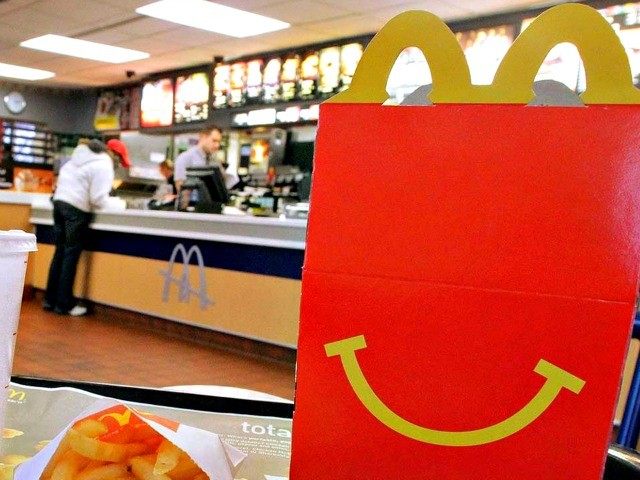Medical researchers have discovered a surprisingly effective way to dramatically increase healthy lunch choices: label foods with emoticons and give out a small toy. The results of a school pilot study found that meals labeled with a “green smiley face” and paired with a toy spiked vegetable selection 62% and decreased chocolate milk selection 42%.
Toys were added to the meals three months later. By the end of the study, so-called “Power Plate” lunches increased over 300% (from 7.4% of purchases to 48%). “A two-tiered approach of Emoticons followed by small prizes as an incentive for healthful food selections is very effective in increasing plain white milk, fruit and vegetable selection,” concluded the team’s lead author, Dr. Robert Siegel, in a paper presented at the annual Pediatric Academic Societies meeting in San Diego.
Though the paper didn’t frame it this way, the researchers essentially co-opted McDonald’s Happy Meal marketing to nudge healthier choices. McDonald’s packaging was the original childhood emoticon, with a giant smiley face on the front of the box (and a toy inside).
This is a rather extraordinary effect size in academic research, but not atypical for school food studies. Though children are often stereotyped as picky eaters, studies find that children are surprisingly malleable under the right conditions. One study found that paying children small sums of money increased fruit and vegetable consumption 80%, while another found that emoticons alone were a significant factor in voluntary eating choices among very young children [PDF].
It is worth noting that this is a pilot study, and external incentives can have quirky long-term impacts. Occasionally, incentives can wipe out internal motivation by changing the behavior of children who will learn and eat healthy for personal reasons into kids who will only behave well for money or prizes.
Incentives are tricky. This is why it’s so important to study the impact of emoticons alone (which the researchers in the pilot did not do). Emoticons may have all the upsides of encouraging healthy behavior, without any of the long-term risks associated with external incentives. Information, alone, may be a key to healthy eating.
For now, all we have is very promising hints that there is power in emoticons. Read more about the presentation paper here.
*The Ferenstein wire is a syndicated news service. For licensing, sponsorship, or general inquires, email greg at greg ferenstein dot com.

COMMENTS
Please let us know if you're having issues with commenting.